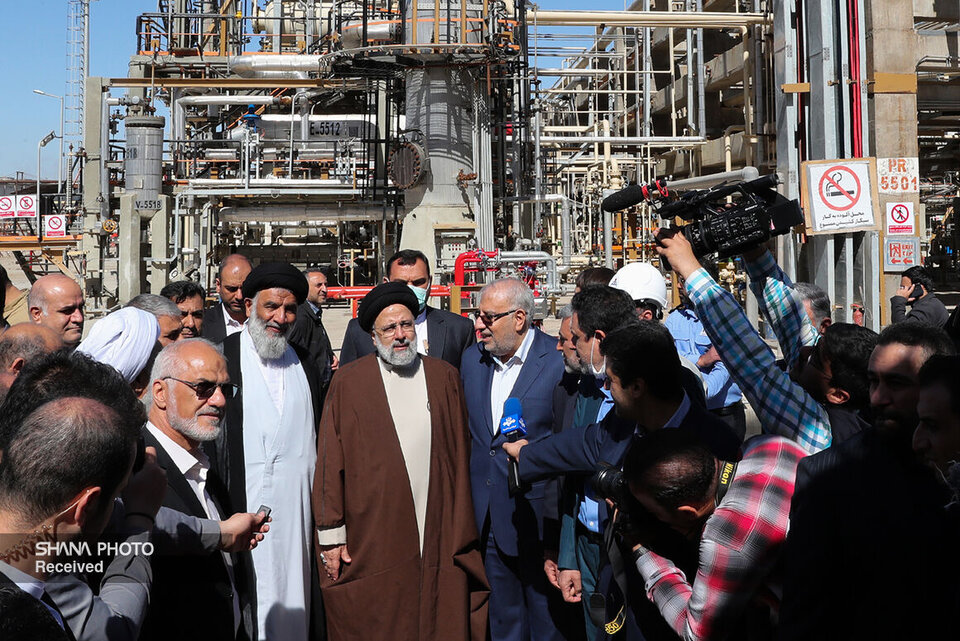“With the operation of Phase 2 of this refinery, 210 tb/d would be added to the refining capacity of the country,” said Raeisi, adding that Iran’s petroleum industry had made this breakthrough despite tough sanctions imposed on the country.
100% Iranian
Raeisi said the US and Britain wrongly imagined they were the only ones capable of performing tough and complicated work. He added that the Abadan refinery project showcased a valuable manifestation of “we want, we know and we can”.
He said that the second phase development of the Abadan refinery had been handled “100 percent” by Iranian technicians and service workers.
Raeisi said the Abadan refinery’s second phase development was harmonious with the state policy of preventing crude oil sales. He added: “With the implementation of this project, Iran will see its gasoline and gasoil production capacity grow respectively 4 ml/d and 3 ml/d.”
He said 36% of the project, which was the most difficult part of it, had been carried out over the past one year alone.
Raeisi also touched on Iran’s plan to build refineries overseas, adding: “Iranian specialized forces were sent to Venezuela to salvage its petroleum industry. It shows the high capability of Iran’s oil industry in exporting technical services and dispatching efficient and effective manpower to petro-states across the globe.”
Self-sufficiency
Minister Owji said Iran was currently producing 3 mb/d of oil, adding the country’s production capacity stood at 3.85 mb/d. He added that 31 incomplete projects, worth $112 billion, had come online last calendar year.
Owji said that the Abadan development project was about 64% complete when the 13th administration took office.
Referring to the $1.1 billion investment made in this phase, the minister said: “With the implementation of the second phase development of the Abadan refinery, gasoline production increases from 10 ml/d to 14 ml/d and gasoil production from 15 ml/d to 18 ml/d.”
According to Owji, processing every single barrel of oil at this refinery would give a $12 margin, let alone supply feedstock to downstream industries and petrochemical plants. He said 75% of equipment is Iranian.
More than 100 contractors and 7,000 service workers were involved in this project, he said, adding that the most complicated part of the project was carried out over the past one and half years. “That was against the backdrop of toughened unjust sanctions and decline in oil exports.”
“According to Central Bank of Iran (CBI) figures, the petroleum industry experienced a record 15.1% growth during the third quarter of last calendar year,” he added.
Noting that Iran had become self-sufficient in oil and gas refinery construction, Owji said two more refineries would become operational in the current calendar year.
$5bn foreign investment
Owji said the 13th administration had a desirable record in the energy diplomacy, adding: “We have so far attracted $5 billion in foreign investment to develop oil and gas fields. Meantime, gas exchanges between Iran and Turkmenistan have doubled. The two countries’ gas ties had been strained for five years, but they were resumed under the current administration.”
Touching on the construction of a refinery in Venezuela, he said: “So far, 2.8 million items of Iranian equipment have been sent to Venezuela. Within months, the oil processing capacity of the refinery in Venezuela would increase from 100 tb/d to 140 tb/d. Iran would also supply oil as feedstock to that refinery, which would be a win-win deal.”
Refined products export
The Abadan refinery is the first in the Middle East. Built in 1912, it is currently processing 400 tb/d of oil and supplies 25% of national fuel needs. The Abadan refinery development project is defined in three phases. Phase 1 and Phase 3 have already become operational. In Phase 1, the distillation unit’s capacity increased from 130 tb/d to 180 tb/d. The vacuum distillation unit came online in 2005 with a capacity of 70 kb/d and the viscosity reduction unit with a capacity of 25 tb/d to reduce fuel oil production and feed CAT cracker.
Phase 3, which came on-stream in 2011, aimed to increase gasoline production while cutting fuel oil output.
Phase 2 has two sections. Work on the first section started in 2017 following an agreement signed with a consortium comprising Oil Design and Construction Company (ODCC) and a Chinese firm. Phase 2 requires €2.6 billion in investment, €1 billion of which has already been financed while €1.6 billion would be financed for the second part. The idea is to make the Abadan refinery more profitable, bring products to Euro-5 standards, reduce environmental pollution, increase kerosene and premium gasoline production by upgrading the production technology, reduce fuel oil output and stabilize the refinery’s capacity. The new products now include LPG (1.5%), kerosene and jet fuel (22%), gasoline (21%) and gasoil (24%).
The operation of this new unit paves the way for the Directorate of Planning of National Iranian Oil Refining and Distribution Company (NIORDC) and Ministry of Petroleum to raise the capacity of tis refinery to above 500 tb/d if there is a need for fuel consumption management in the country.
Therefore, the second phase development of the Abadan refinery would offer a chance for exporting more refined products due to increasing the output capacity and improving the quality of products.
The Abadan refinery receives crude oil from the Omidieh and Ahvaz oil fields located in Khuzestan Province. The second phase development would empower the facility to refine a wider range of crude oil grades to produce high-quality products. The refinery is currently supplying 11 products.
Iran Petroleum


Your Comment